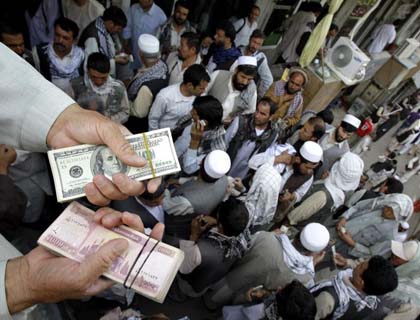The plan of NATO countries to pull out their forces from Afghanistan in 2014 has run waves of panic among business circles of this country. Businessmen who have dared to invest in Afghanistan - despite serious threats and challenges - are now worried about the future of their businesses amid deteriorating security condition and growing political instability. The sense of insecurity has discouraged both domestic and foreign direct investments at an important juncture where the international aids on which Afghanistan's economy has been running, are expected to diminish.
Any prospective private equity investor will examine the risk-return trade-off, the ability to have equity contracts enforced, and the ability to quickly withdraw his stake, if necessary. If an institutional structure does not exist which protects the equity investor or the long-term investors, investments simply will not be forthcoming.
Over the last decade, no significant efforts have been in place to alleviate constraints lying ahead of business and investment in Afghanistan. Worsening security has added fuel to the fire. After the Taliban were toppled in late 2001 as a result of US-led invasion, a new window of hope and affluence opened for Afghanistan.
One of the areas under international focus was to boost up Afghan economy by encouraging investments. Encouraging the private sector was deemed vital for reaching this purpose. Attracting the foreign and domestic investment – in agriculture, industries (including mining), education, telecommunication, transportation and etc - fell among the key plans of the government and its foreign backers, although plans remained plans only. As we moved ahead, the security situation got worse with each passing year hampering all kinds of expected developments including attraction and encouragement foreign and domestic investments.
In 2003, Afghanistan Investment Support Agency (AISA) was established to facilitate registration and licensing of private investments in Afghanistan. In experts' opinion, the AISA is a success for Afghanistan. According to the World Bank's 2011 "Doing Business" figures, it takes fewer bureaucratic steps and days to start a business in Afghanistan than in many other countries of the world. Undoubtedly, establishment of AISA, amendment of laws, better customs procedures and approval of new taxation law etc have been very useful for supporting the investment and business activities in Afghanistan but yet hindrances remain at large, the greatest of which is deemed safety of the life of investors and country's general security environment.
In addition to threats to the lives business and traders, the overall security condition of Afghanistan has turned extremely horrific and is not at all feasible for attracting investments. Taliban has continued its attacks. Only last year according to the UN figures about 3,000 innocent civilians were killed. The series of targeted killing - that has been continuing in the country since long and government fails to counter it – has caused many important personalities including businessmen and investors to escape the country. Fear has been the reason for the billions of dollars leaving Kabul airport every year.
Burhanuddin Rabbani, Afghanistan's ex-president and head of High Peace Council, Ahmad Wali Karzai, Head of Kandahar provincial council and brother of President Karzai, Jawad Zahak, head of Bamiyan provincial council, Gen. Dawood Dawood, police commander in north zone and Khan Muhammad Mujahid, Kandahar police chief were all killed last year in August, July, June, May and April respectively. Targeted killings continues this year, as recently Mawlvi Arsla Rahmani, Karzia's key peace envoy and member of Afghan senate was gunned down near his home in daylight. In addition to that suicide/roadside bombings, IED attacks and direct clashes between security forces and insurgents take toll on daily basis.
With such condition sustainable development in economy is entirely impossible. Such news present a bleak image of Afghanistan to the world which is a great harm to efforts aimed at attracting investments. The security factor is majorly responsible for the concerning economic condition and low-level of investment we have today. Although Afghanistan is could be an attractive market for investors, bad security has turned attaining a desirable level of investment into a dream. If the condition persist as is, it is far difficult for Afghanistan to become self-reliant in economy – for which attracting investment has a vital role to play.
Due low capacity the government has no proper planning for the growth of economy and currently more than 90 percent of its activities are being funded by international community. According to experts, international funds are not going to last for long. With the international community's withdrawal in 2014, the foreign funding to Afghanistan is expected to shrink largely.
The DW has quoted Thomas Ruttig, a researcher with the Kabul-based Afghanistan Analysts Network as saying, "We have heard unofficially, but very clearly from many European and other Western governments that when the soldiers go, the money will go with them. I am afraid that after 2014, Afghanistan will be treated just as any other developing country." Rutting warns, "An economic depression could sling Afghanistan back for years and it could end up as a failed state like Somalia." In the absence of a long term strategic plan aimed at economic development, investment is subject to diminish.
The long term war has resulted in destruction of the little infrastructure Afghanistan had to generate power. Lack of electric power in the country is deemed another great obstacle to investment. Today our country imports electricity from central Asian countries like Tajikistan and Uzbekistan. The imported power is not enough to lighten the major cities of Afghanistan and there we should not be thinking of it to fulfill the needs of heavy machineries used in industry and agriculture sectors.
Unskilled labor force, deep-rooted corruption, destructed infrastructures, drug trafficking, political instability, lack of transparency and accountability at all levels and several other such factors contribute to keeping investors away from Afghanistan. Nonetheless, all these factors can be countered over the passage of time. The only thing the government and international community need to focus on is improving security.

